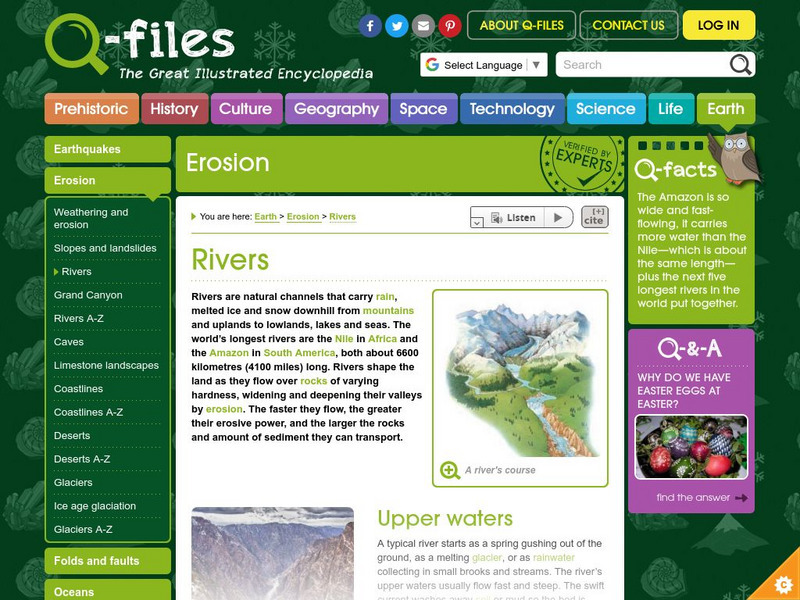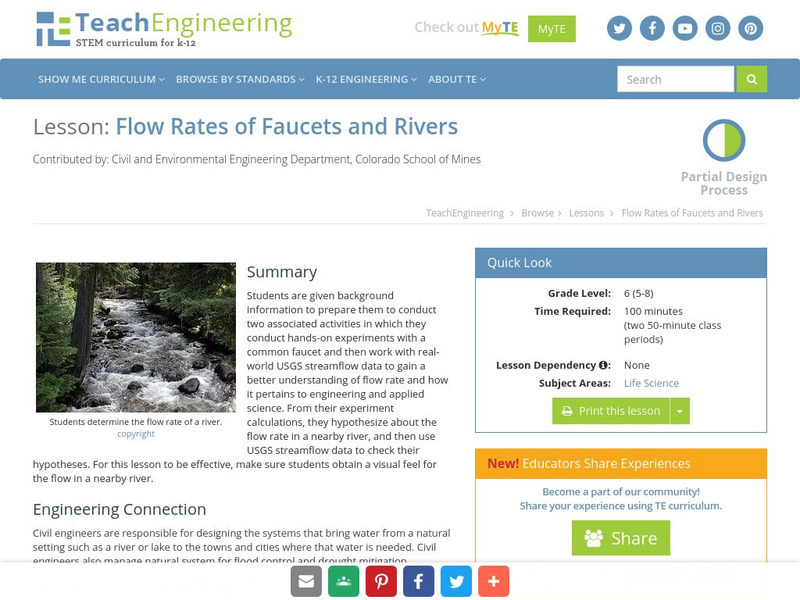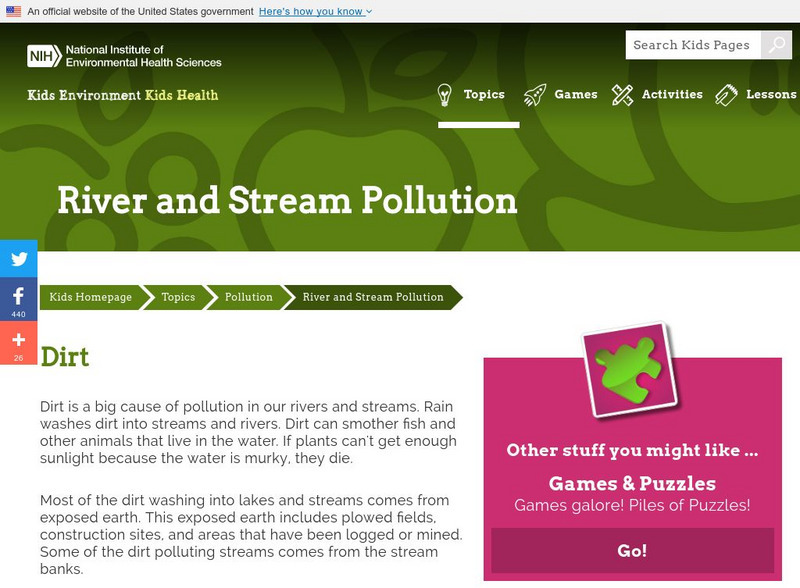US Geological Survey
U.s. Geological Survey: Rain
At this site from the U.S. Geological Survey you can find out what makes rain such a valuable resource. Included is a chart that tells how much rain different cities in the United States receive. Click Home to access the site in Spanish.
Orpheus Books
Q Files: Earth: Erosion: Rivers
Identify the upper waters, lower courses and whatever "falls" in between while studying the science of rivers.
National Association of Geoscience Teachers
Nagt: Variable Rivers
In this lesson students will be introduced to rivers and river processes. They will test an isolated variable in rivers and they will test either the amount of water, velocity of water, or steepness of the river bed to determine how...
TeachEngineering
Teach Engineering: Flow Rates of Faucets and Rivers
In the Flow Rate Experiment, students perform hands-on experiments with a common faucet, as well as work with the Engineering Our Water Living Lab (accessible through TeachEngineering.com) to gain a better understanding of flow rate and...
National Wildlife Federation
National Wildlife Federation: Platte River
Visit this resource to briefly explore the ecosystem, discover the wildlife, and understand the threats to Nebraska's Platte River.
US Geological Survey
Usgs: Earth's Water Surface Water
This site has everything you might want to know about surface water and things you probably didn't even imagine! Click Home to access the site in Spanish.
Other
Minnesota Lakes, Rivers and Streams
This site gives information about Minnesota rivers and streams, stream flow information, and recreational information as well.
US Geological Survey
Usgs Earth's Water: Rivers and the Landscape
Describes the formation of rivers and the transport of soil and sediment. Links to related material is provided within the text.
Center for Educational Technologies
Nasa: Classroom of the Future: Spheres: Hydrosphere
Use this site to learn about the millions and trillions of gallons of water that covers the earth, known as the hydrosphere.
US Geological Survey
Usgs: How Much Water Is There on (And In) the Earth?
The USGS gives an overview of the amount of water on Earth and where it is located. It gives a few interesting facts about the Earth's supply of water. Click Home to access the site in Spanish.
Other
Center for Columbia River History: Promoting the Study of Columbia River
The Center for Columbia River History contains information about a river that spans seven states and a territory in Canada. Understand the environmental factors that contribute to this river.
PBS
Nh Pbs: Nature Works: Rivers and Streams
Learn more about Rivers and Streams through this educational resource. This site features photographs, a description, fun facts, and more about this type of freshwater ecosystem.
CK-12 Foundation
Ck 12: Second Grade Science: A World of Ice and Water
[Free Registration/Login may be required to access all resource tools.] Covers different bodies of water, including rivers, lakes, and oceans.
CK-12 Foundation
Ck 12: Earth Science: Streams and Rivers Study Guide
[Free Registration/Login may be required to access all resource tools.] This study guide summarizes key points about streams and rivers. Includes a few questions to check for understanding.
Encyclopedia Britannica
Encyclopedia Britannica: Volga River
In this entry you will read about the physical features, economy, and study and exploration of the Volga River, Europe's longest river.
Alabama Learning Exchange
Alex: River's Path
What determines the path of a river? Rivers follow the path of least resistance changing the landscape by carrying sediment and debris along the way.
National Institutes of Health
Niehs: Kids' Pages: River and Stream Pollution
What makes our rivers and streams dirty? This brief overview discusses the causes of pollution in rivers and streams and how to solve it.
State Library of North Carolina
N Cpedia: Catawba River
Catawba River rises in the Blue Ridge Mountains of McDowell County, approximately 20 miles east of Asheville, flowing east-northeast above Hickory until turning southward into the massive Lake Norman Reservoir. It then continues south,...
Jim Loy
Jim Loy's Geology Pages: Meandering Rivers
Provides a diagram and a description of the movement of rivers and meandering patterns.
Other
Chebucto: Soil & Water Conservation Society of Halifax
This site provides statistical information about rivers all around the world. Stats include mean discharge, drainage area, and length.
Other
Monroe County Women's Disability Network: Maps & Globes: Water Forms
This site is provided for by the Monroe County Women's Disability Network. Some basic information about water on our planet and the various water forms that make up three-quarters of the earth's surface. Includes some simple quizzes to...
US Geological Survey
Usgs: Edna Derived Watersheds for Major Named Rivers
A watershed index where students can click on a map of the U.S. to find the names and locations of watersheds. Students can also download a file that can be run in Google Earth to view more about the watershed.
Channel 4 Learning
4 Learning: Geography Essentials: Investigating Rivers
A description of rivers, their uses, and their formation. There are worksheets and links for additional teacher support.
Sophia Learning
Sophia: Freshwater Biomes: Lesson 2
This lesson will provide an understanding of the characteristics and role of freshwater biomes, and its effect on living things. It is 2 of 4 in the series titled "Freshwater Biomes."















